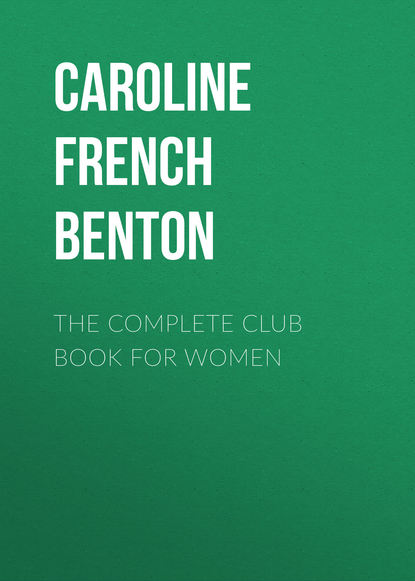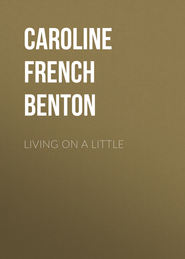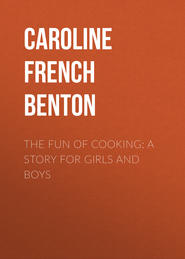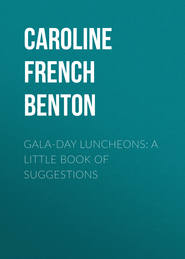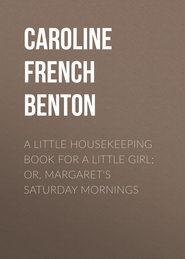По всем вопросам обращайтесь на: info@litportal.ru
(©) 2003-2024.
✖
The Complete Club Book for Women
Настройки чтения
Размер шрифта
Высота строк
Поля
Close this meeting with a talk by a trained kindergarten teacher, if possible, who can set before the club members the advantages of her work. If there is time, have some short stories read: "The Madness of Philip," by Josephine Baskam Bacon, and one from "Little Citizens," by Myra Kelly (both by Doubleday Page). Some songs of childhood will also be delightful between the papers or talks, and perhaps some little kindergarten children may come and sing also.
III – PUBLIC SCHOOLS
The next subject, that of the public school, is so large that a number of meetings should be devoted to it. Although only four papers are outlined here, there is sufficient material given for a dozen and more.
The first paper may speak of the early days of public schools and their inadequacy in the light of to-day, of their lack of sunshine and air, the poor buildings, the insufficient exits and arrangements for safety from fire. Then follow with a description of our great schools of to-day, showing pictures of them and noticing their beautiful architecture, their perfect equipment. The whole system of discipline and oversight should be spoken of.
The cost to the State of the public school is an interesting theme. Notice in this connection that the United States has the shortest school day, week, and year of any civilized country. Discuss the fact.
The second paper should speak of the curriculum of the public school, and give a clear idea of what is covered by the child. Discuss: Is it too comprehensive? Is it sufficiently practical? Does it fit the child for business and home life?
The third paper should be on the health of the school child as the club members know of it. Is the building in which he studies clean, well-ventilated, and sanitary? Does he have too much home work? Is there a doctor to supervise the children's eyes, ears, throats, and general condition? Is there an oversight against contagion? Is the common drinking cup used? Is there a fund for cheap food for the very poor children?
The playgrounds and plays should be the next topic. These should be large, fitted to the needs of boys and girls, and there should be a teacher of athletics. Basket ball, foot and base ball, and games of all sorts should be encouraged, and a spirit of rivalry between schools fostered. Discuss: Are athletics neglected or overdone? Do our growing girls receive the care they need in this regard? If the playgrounds of the school are inadequate, can they be supplemented? Are the playgrounds used in summer time?
A brief paper following this may speak of the morals of the public school, the dangers and safeguards, and discuss the relation between teachers and parents in this regard. Is hygiene taught? Is a high standard of purity held up always?
Follow this by a presentation of the value to a school of a club for parents and teachers; one may be established if there is none, perhaps. Beautifying the schoolhouse and schoolroom, having a library and a few pictures and casts, and making school life attractive are suggestions to be worked out, and the value of teaching sewing, cooking, the care of babies to girls, and manual training to boys.
IV – HIGH SCHOOLS
The subject of the high schools will naturally succeed this and the first paper may take up the question, Why do so few boys and girls go to high school? Is it only because so many go into business life? Is the preparation for college adequate? Is the general course too cultural and not sufficiently practical for a boy who is going into business? Are sufficient numbers of courses offered?
The next paper may speak of vocational training, or fitting boys and girls for their work in life, teaching girls to sew, cook, and care for children, and boys to farm, to learn the principles of business, and manual training. What has been done along these lines, and what is still to be done?
The third paper may speak of vocational guidance or the aid given in finding work for graduates suitable for them, and following them up in it. Material for this may be had from the Vocational Guidance Association of New York, part of the Public Education Association, 38 W. Thirty-second Street.
Many other topics will grow out of the discussion of school problems. Some to be discussed are these: Equal pay for men and women teachers; the married teacher in the school; the personal influence of the teacher; the efficiency of the school; the training in citizenship. It is urged that club women have members of their Board of Education and school teachers speak to them on as many subjects pertaining to school as possible, and become better fitted to coöperate in the work of the schools.
V – SPECIAL SCHOOLS
The next meeting of the club may have a varied program: one paper will be on schools for the defectives, the blind, deaf and dumb and feeble-minded. A second will take up the use of the school buildings for evening classes and lectures, for parents of school children, for men and women who need a broader education, and for foreigners. Some idea may be given of the great work done in this way in our large cities in the way of instruction and recreation. A third paper may speak of the numberless aids to schools in the way of libraries, museums, nature classes, and special instruction. A final paper may be on Schools for Teachers, and the work done there. Some teacher should describe this. Have some readings from "The Wider Use of the School Plant," by Clarence A. Perry (Sage Foundation).
VI – PRIVATE SCHOOLS
A very interesting meeting may be arranged on private schools. This will have a paper or talk on college preparatory schools for boys, showing how thorough the training is. It will raise such questions as these: Are standards of character higher than in the public schools? Is the training in athletics valuable? Do boys go from them to college better prepared to meet the life there than from the high school? Is there a lack of democracy about them? Do they send a yearly clique to college?
The paper next to this would be on the finishing school for girls, and will raise the questions: Are the standards of education sufficiently high? Is a mere smattering given? Is too much attention paid to social preparation? What advantages has the finishing school?
The following paper would take up military schools, first the small private ones, then West Point, giving the life at each, the training, the advantages and disadvantages. Show pictures of West Point.
A paper on naval schools would come last, especially on Annapolis, and would follow the same lines as the paper on West Point.
The final paper should be on technical schools, those where mining, electricity, engineering, architecture, and other subjects are taught. There are great institutes in Pittsburgh, Boston, and elsewhere, from which catalogues may be obtained to show exactly what work is done there.
Modern schools of domestic science and business colleges should be considered.
VII – COLLEGES AND UNIVERSITIES
Colleges and universities is the next subject for the club. The best known of the colleges may be described and pictures shown, and the difference between a college and a university made plain. Denominational colleges should especially be spoken of, and the little colleges of the West and South. The value of the small college in bringing students near their teachers may be pointed out. Some of our great men have come from these little colleges, and they may be mentioned.
The next paper should be on the university. The leading endowed universities are to be named, their history studied, and their peculiarities noted. The famous presidents, professors, and graduates of each should be spoken of also. The curriculum, the athletics, the ideals of each university may also be taken up. Notice that those universities which have private endowments often stand for culture rather than practical work.
The third paper should take the State Universities, and show the difference between them and the endowed universities. They stand distinctly for what is practical, and it is here that most technical work is done and specialties, such as agriculture, forestry, domestic science, and others, are taught. Discuss the relative values of the two; is there a tendency more and more toward having the State give the whole education? How do our great endowed universities compare with those of England and Germany?
VIII – WOMEN'S COLLEGES
One meeting should be on women's colleges, taking them in the order of their establishment, and showing how they have developed. Have descriptions of each and tell of its special aims. Discuss the value of a college training for women, and its faults. Speak of coeducational colleges and State Universities; have they advantages over the rest? Does a college woman lose interest in her home? Does she marry early, or does she drift into a career?
Have some college woman address the club on work done in the line of higher education of women, and its results. See "The College Girl of America," by Mary C. Crawford (The Page Company).
IX – POSTGRADUATE WORK AND NEW IDEAS
Postgraduate work, the topic for the next meeting, includes that done in medical, law, and theological schools, and the work for degrees. Representative schools may be selected as the subject for papers, and speakers from these should be had to tell of them to the club, if possible.
The final meeting on education may take up some of the new ideas of work, such as the opening of the school of journalism at Columbia University, and other attractive fields of study. Summer assemblies may be spoken of, and their value, especially to those who have had few opportunities for study early in life. Correspondence schools may also be mentioned and their work discussed. Are they really as useful as they seem at first sight? Notice that many of them are able to give important help on special lines. Musical festivals, lecture courses, illustrated talks on travel, and other of the many opportunities offered to the public may also be spoken of.
There is an abundance of material to be found on all educational subjects in a good encyclopedia. On special topics there are the educational journals, the educational department of the Survey, and magazine articles constantly. The Educational Bureau at Washington will give information and material on request. The excellent book "Citizenship and the Schools," by J. W. Jenks (Holt), should be read, and "Education for Efficiency," by E. Davenport (Heath), and the life and work of Horace Mann.
CHAPTER XIX
Special Programs on Great Men and Women
Often a club finds it best to break into its ordinary routine of work by having a special program. The birthday of a great writer, artist or musician offers a good subject for such a meeting, and the following programs are arranged to suggest such names with a brief outline of work on each.
Some clubs may like to select from the names given two or more for each month and so arrange a program for an entire year. In this case it is a good plan to take alternate writers, musicians and artists, giving a day to each one.
I – SEPTEMBER
History, music and literature may be represented by the life and work of Queen Elizabeth, General Lafayette, Dvorak, and our own Eugene Field, who were all born in September.
Divide the age of Elizabeth into several topics: the Court and the Queen's favorites; discoverers; wars; Mary, Queen of Scots; and the great literary men of the time, Shakespeare, Ben Jonson, Spenser, and others. Have readings on all these.
The story of Lafayette begins with the American Revolution; then the Revolution in France and the part he played in it. Follow his career and friendships, and the relations between France and America. Close with a sketch of Lafayette's visit here after the war, and read a description of it. (See the Diary and Letters of Gouverneur Morris.)
A good musical program can be arranged by having first a paper on the composer, Dvorak, with comparisons of his work and that of his contemporaries, and then several selections played from his compositions.
Last, the life and work of Eugene Field will be found delightful. Have a paper on his home life, his whimsical personality, his friends; read from his prose, and have some of his verses sung. Compare his poems with Stevenson's "Child's Garden of Verse."
II – OCTOBER
In this month art, drama and music are offered, in the works of Sir Christopher Wren, Sheridan and Verdi.
In art Wren was a prominent figure in his century. Living when London was being rebuilt after the great fire, he stamped his genius on no less than fifty churches, and built St. Paul's, his own great monument. He was called a "rare and early prodigy of universal science." His friendships are among the most interesting points to be studied.
Richard Brinsley Sheridan wrote the "Rivals" and "The School for Scandal," two plays which stand unequaled for humor and clever satire. Read of their presentation, and of Sheridan as manager and theater owner. Turn from this to his career as a parliamentarian and read his speech at the trial of Warren Hastings, which marked him as one of our most brilliant orators. Notice his death in poverty and his burial in Westminster Abbey. Read from his plays.
Verdi wrote "Ernani," "La Traviata," "Riggoletto" and "Aïda." Speak of his long and interesting life, and his remarkable work. Note that his influence over others was of unusual force. Have a musical program from his operas.





